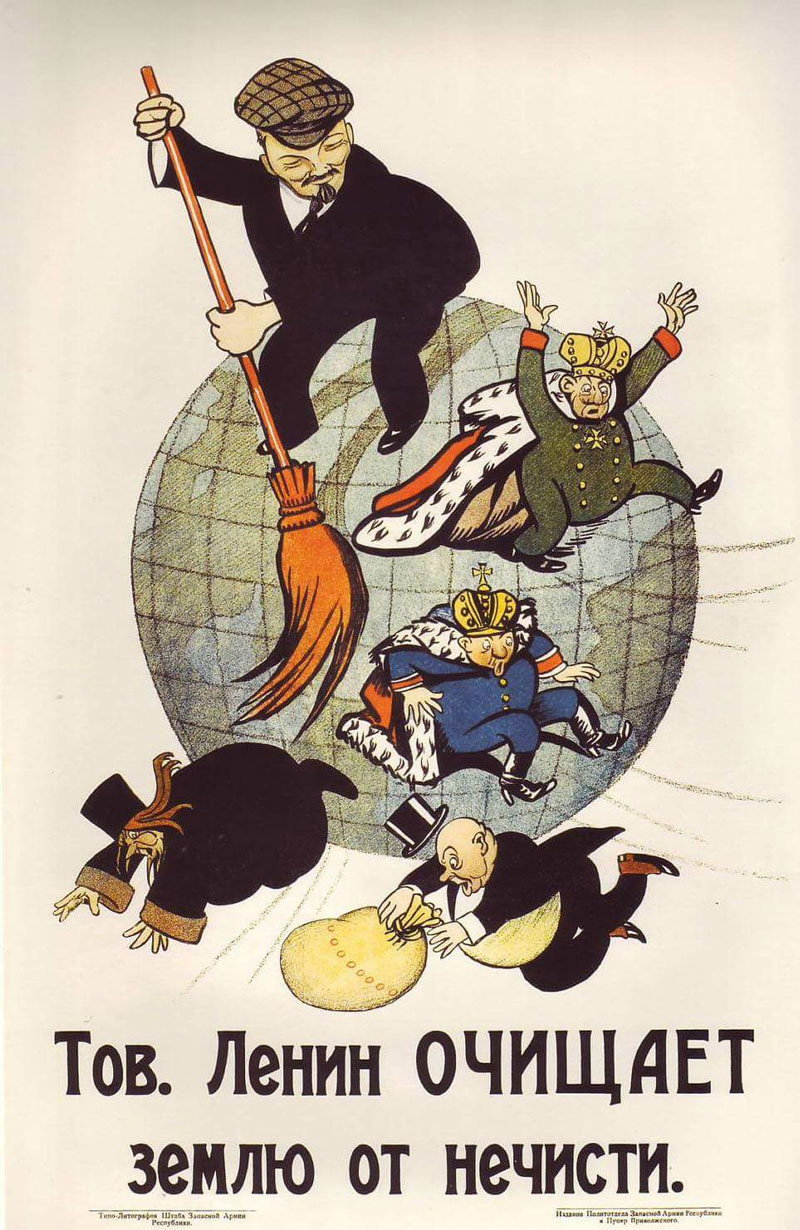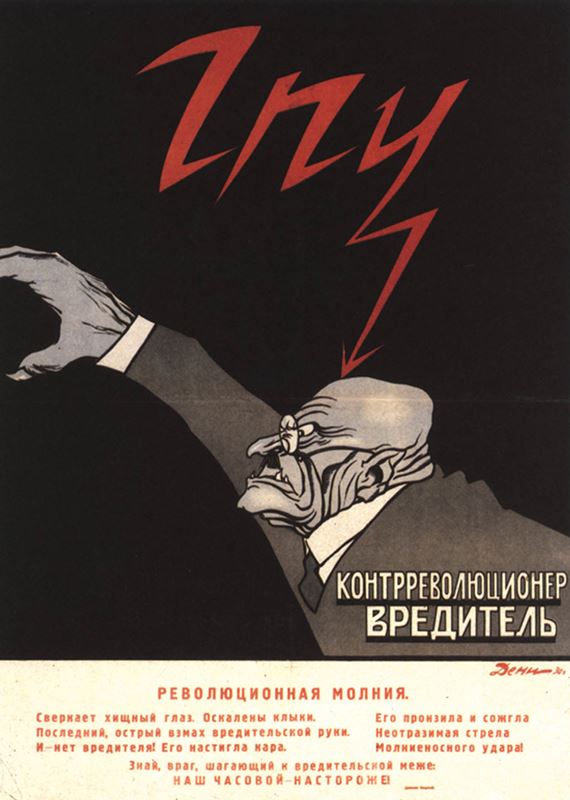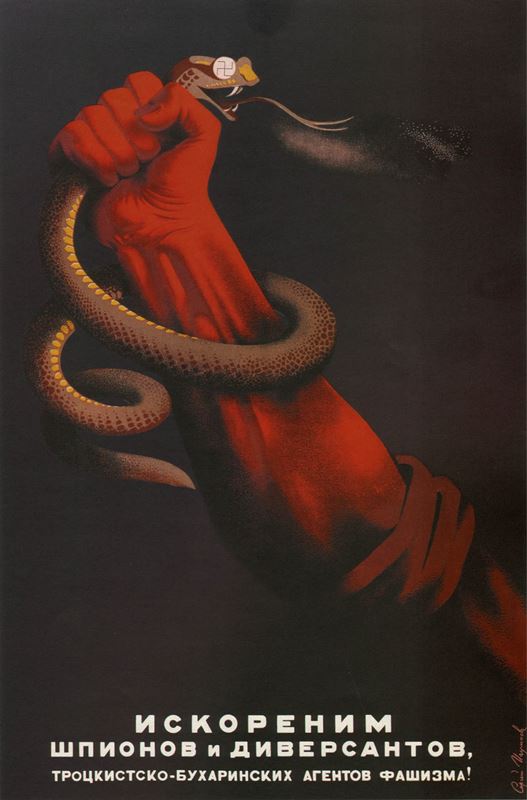Glossary of Soviet Hate Speech
During its more than 70 years of existence the Soviet communist power developed special terminology to be used for marking real, assumed, or imaginary ideological enemies and working up anger among the society against them. These terms made a regular appearance in the Soviet mass media and the speeches of Communist Party leaders. They can be found in hundreds of thousands of criminal files and rulings. Once people were labelled with one of those terms, they were most probably under arrest already or about to be arrested presently. Persons bearing such a „stamp” could expect to be deported, sent to a prison camp, or shot. Below is a list explaining the most widespread terms of hate speech in the Soviet political vocabulary, reflecting the ideological fanaticism and absurdity, but also millions of ruined lives. The list is based mainly on the „Explanatory Dictionary of Sovietisms“ (V. Mokijenko, T. Nikitina, Saint Petersburg, 1998).
Socially alien element (in Russian: социально чуждый элемент) – a general term about individuals and whole social groups, who were considered unsuitable for the Soviet society and were therefore stripped of their civil rights, lost their jobs, suffered from coercion and repressions. They included representatives of various religions, entrepreneurs, small traders, farmers, craftsmen, freelancers etc.

Anti-Soviet element (in Russian: антисоветский элемент) – a person or persons who had acted or were currently acting against the official Soviet ideology or regime. There were persons who did not take active steps against the Soviet rule, but were still called anti-Soviet, as the authorities considered them a (potential) threat because of their former field of activity or social status, e.g. members of non-communist parties, persons with foreign connections etc. In territories occupied by the Soviet Union this term was almost automatically used to refer to the representatives of the public authorities and civil society of the occupied country. „The Soviet security organs face the task to rid the country once and for all of the entire gang of anti-Soviet elements (...)”. Operative Order of the People’s Commissar for Internal Affairs of the Soviet Union No 00447 of July 30, 1937, Moscow.
Kulak (direct translation: fist, in Russian: кулак) – a wealthy farmer and owner, who employed hired labour in the Soviet Union. Many farmers were labelled as kulaks because of other reasons as well, e.g. personal views and convictions, unwillingness to surrender their property to the Soviet state or just running a successful farm. „Kulaks are the most brutal, callous and savage exploiters”. Vladimir Lenin, Collected Works (1948, Moscow), vol. 37, p. 40.
Kulak henchman (direct translation: under the fist, in Russian: подкулачник) – in the Soviet political rhetoric, a peasant who acted for the benefit of a kulak or supported a kulak. The term „kulak hanger-on” (in Russian: кулацкий прихвостень) was a synonym of the same. „(...) a term devised by the Soviet propaganda to denote those poor peasants, who refused to loot the kulak households during forced collectivisation or who caused the anger of the Soviet authorities in any other way”. J. Rossi, The Gulag Handbook, (1991, Moscow), vol. 2, p. 289.
Enemy of the people (in Russian: враг народа, also enemy of the revolution, class enemy, ideological enemy) – a badly defined accusation in the Soviet Union, covering a wide variety of charges. This is a widely used term to justify repressions and foment intolerance in the society against the individuals and groups so labelled. Often a person’s CV was enough to be classified as an enemy. „The opponents to the party line had been exposed as enemies of the people”. The Resolution of the Communist Party of the Soviet Union (1954, Moscow), vol. 3, p. 335.
Spy (in Russian: шпион) – a person engaged in obtaining (mostly secret) information for a foreign country. Especially during the Stalinist purges the Soviet security services used numerous fabricated charges of spying for the benefit of another country as a basis for convicting and murdering many individuals; any contacts with citizens of other countries were deemed as spying. „They were „persuaded”, persuaded by using certain schemes into admitting that they were … spies”, Documents of the 22nd Congress of the CPSU (1961, Moscow).
Bourgeois (from French: bourgeois, in Russian: буржуй) – according to the official Soviet rhetoric a representative of the bourgeoisie, the ruling class of capitalist society, who defends and perpetuates the exploitation of the workers. The original meaning of the word denotes a person who has property, money, and economic influence. According to communist doctrine, they were the greatest enemy of the workers in class struggle, who must be eliminated completely from the society. It was a term used to dehumanise individuals who were better off as a result of their activities and work.

Counterrevolutionary (in Russian: контрреволюционер) – a person opposing the revolution. An opponent of the Bolshevik regime that took power in the 1917 October Revolution. In reality, an individual, group or organisation was often labelled as counterrevolutionary because of irrelevant acts, their origin, or false accusations. Article 58-1 of the Penal Code of the Russian SFSR (1926) contains a very broad and vague definition of counterrevolutionary action, granting the security services practically unrestrained power: „ A counterrevolutionary action is any action aimed at overthrowing, undermining or weakening of the power of workers' and peasants' Soviets or of the workers’ and peasants’ governments of the USSR, union and autonomous republics, chosen by them on the basis of the constitution of the USSR and the union republics, or at the undermining of the external security of the USSR and the main economic, political and national achievements of the proletarian revolution.”
Former people (in Russian: бывшие люди) – persons who lost their social status and often also their livelihood because of the October Revolution. Primarily they were members of the clergy, imperial officers, aristocrats, civil servants, traders, wealthy peasants, entrepreneurs etc. The Soviet security services kept a close eye on the „former people”, and they were the first victims of mass repressions, unless they were lucky enough to escape from Russia.
Nationalist, bourgeois nationalist (in Russian: националист, буржуазный националист disapprovingly) – a person upholding national mentality, who prefers national feelings and motives to the internationalist policies of the Soviet Union, which was aimed at eliminating national differences and creating a Soviet identity within the framework of the communist class theory. The adjective „bourgeois” was an indication of a class enemy and meant that such a „nationalist” preferred a capitalist way of life. One could be labelled a nationalist simply for being a member of a national minority in the Soviet Union. After annexation by the Soviet Union, pro-independence individuals and those suspected of supporting independence in the Baltic States were also accused of being bourgeois nationalists.
Leftist (in Russian: левак, condescendingly) – in the Soviet rhetoric, an opportunist, who makes leftist statements to hide their anti-Bolshevism. Was used in the Communist Party and in the wider society as well.
Radish (in Russian: редиска) – in the Soviet vocabulary, a person who insincerely purports to support the Soviet regime. White inside (longing for the old tsarist regime) and red outside (pretending to be pro-Soviet). The term „conformist” (in Russian: приспособленец) is practically a synonym.

Trotskyist (in Russian: троцкист) – a supporter of the views of Lev Trotsky, one of the Bolshevik leaders. The term „Trotskyism” comes from the family name of Lev Trotsky (1879-1940), one of the leaders of the October Revolution, who became a political opponent of Vladimir Lenin and Joseph Stalin and was murdered in Mexico. In the Soviet rhetoric, Trotskyism was an anti-Leninist school of thought within the workers’ movement, led by Trotsky. During the rule of Stalin, it became a widely used term to label real or alleged opponents within and outside the Communist Party, and in particular, those who had any connections with Trotsky or his supporters. As a rule, such accusations were followed by arrest. The state propaganda machine developed an entire concept about a global Trotskyist conspiracy. „ Trotskyists are an unprincipled, ideal-less band of wreckers, agents, spies, and provocateurs, a band of enemies of the global working class, acting for hire of reactionary bourgeois governments”, Small Soviet Encyclopaedia (1955, Moscow), vol. 3, p. 436.
Ignorant (in Russian: несознательный, классово несознательный) – a person lacking class and political consciousness as defined by communist ideology. Another term coined in the Soviet Union to describe such persons was „politically underdeveloped”.
Saboteur (in Russian: саботажник) – in the ordinary meaning, a saboteur is a person who intentionally subverts a process or task by poor performance or omission. In the Soviet vocabulary the word denoted persons who were blamed for the failures resulting from bad planning by the Communist Party or who did not show sufficient enthusiasm in pursuing the official policies. Ideologically alien forces were also labelled as saboteurs. „We defeated the military resistance of capital and the capitalists’ sabotage”, Great Academic Dictionary / Dictionary of the Contemporary Russian Literary Language (1950-1965, Moscow) vol. 13, p. 29.
Sources:
„Explanatory Dictionary of Sovietisms“ (V. Mokijenko, T. Nikitina, Saint Petersburg, 1998). Most of the terms referred to in this paper are taken from the above dictionary.
Operative Order of the People’s Commissar for Internal Affairs of the Soviet Union No 00447 of July 30, 1937, Moscow
Penal Code of the Russian SFSR (1926)